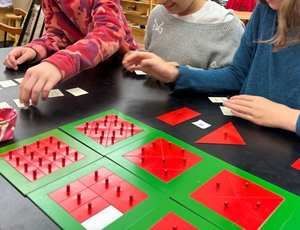
By developing self-regulation skills, Montessori elementary school children become more independent, resilient, and successful in their academic and personal lives. These practical strategies can be implemented in both the classroom and home environment, fostering self-control and emotional well-being.
1. A Supportive Environment
Creating a supportive and nurturing environment is essential for teaching self-regulation to Montessori elementary school children. Establish a warm and inclusive classroom atmosphere where children feel safe to express themselves and make mistakes. Encourage positive relationships, empathy, and cooperation among students. Implement consistent and fair rules to provide structure and predictability.
2. Emotional Awareness
Emotional awareness is a cornerstone of self-regulation. Teach Montessori elementary school children to identify and understand their emotions. Provide them with a rich vocabulary to express their feelings accurately. Encourage open discussions about emotions, helping children recognize that all emotions are valid and can be managed. Teach strategies that regulate emotion, such as deep breathing or taking a break.
3. Mindfulness and Relaxation Techniques
Introducing mindfulness and relaxation techniques to Montessori elementary school children can significantly support their self-regulation journey. Teach simple mindfulness exercises, such as focused breathing or body scans, to help children stay present and calm. Incorporate relaxation techniques, such as progressive muscle relaxation or guided imagery into daily routines.
4. Self-Reflection and Goal Setting
Encourage Montessori elementary school children to engage in self-reflection and goal setting. Provide opportunities for them to assess their own behavior and identify areas for improvement. Guide them in setting realistic goals and breaking them down into manageable steps. Regularly review progress and celebrate achievements together. Through self-reflection and goal setting, children gain a deeper understanding of themselves, develop self-discipline, and learn to take responsibility for their actions.
5. Problem-Solving and Conflict Resolution
Promote problem-solving skills among Montessori elementary school children. Teach them effective communication strategies, such as active listening and expressing needs assertively. Encourage collaboration and empathy when resolving conflicts with peers. Provide opportunities for children to practice problem-solving through puzzles, group activities, and real-life scenarios.
Teaching self-regulation to Montessori elementary school children is a valuable investment in their personal growth and success. By implementing the top five tips outlined in this article—creating a supportive environment, teaching emotional awareness and vocabulary, practicing mindfulness and relaxation techniques, promoting self-reflection and goal setting, and encouraging problem-solving and conflict resolution—educators and parents can empower children to develop lifelong skills for self-control and emotional well-being. These strategies foster independence, resilience, and a positive approach to life’s challenges, ensuring a solid foundation for future academic and personal achievements.
The best way to learn more about the Montessori prepared environment is to see it in action. Schedule an appointment for a tour today to see Montessori in action.


